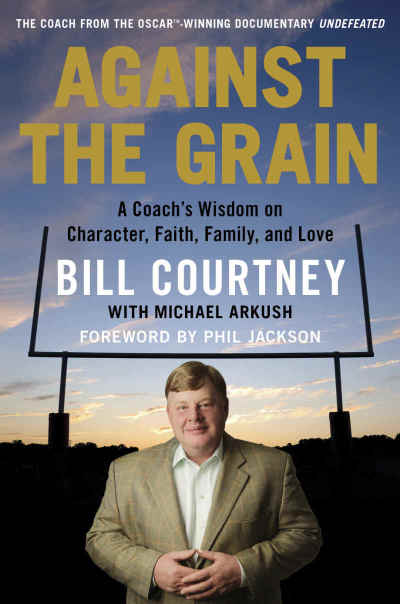Bill Courtney, 'Undefeated' Coach and 'Against the Grain' Author, Says Christ and Gandhi Modeled Leadership Best

NEW YORK — Bill Courtney knows a thing or two about what it takes to be an effective leader. The Tennessee native, businessman and author, was the subject of an Oscar-winning documentary that chronicled how he helped transform a group of at-risk teens into a tight-knit and highly motivated football team.
Courtney has just released the book Against the Grain: A Coach's Wisdom on Character, Faith, Family, and Love (co-authored with Michael Arkush), and in its pages shares principles on character, commitment, service and leadership that he has learned over the years and have brought him success, especially as operator and owner of a $40 million lumber company.
Effective leaders take on a servant's mindset, he said, and are consistent, authentic and sincere in the lives of those they have been called to lead.
Those same principles, informed by his faith and own experiences being raised in a single-parent household, were what Courtney preached and practiced before the initially reluctant and skeptical group of Memphis, Tennessee, teens featured in the 2011 documentary Undefeated.
Courtney, Esquire magazine's 2012 Coach of the Year, explained to The Christian Post, "The movie is not about football. It has nothing to do with being undefeated on the field. It's about not being defeated by your circumstances." In Against the Grain, Courtney reveals how such a mindset not only proved critical in the lives of people close to him, but how unwavering determination, faith and a desire to succeed helped him overcome his own personal challenges.

In his discussion with CP, Courtney shared his definition of leadership, why he believes service and good leadership go hand-in-hand, and what he thinks Jesus Christ, Martin Luther King, Jr., Nelson Mandela, and Gandhi have in common.
Below is a transcript of CP's interview with Courtney, followed by his "CP Newsroom" video appearance.
CP: What is your definition of leadership?
Courtney: Leadership is getting out of one's comfort zone, which is a little cliche. But quit operating in a vacuum of thought, surround yourself with people who don't necessarily look like you, think like you (and) do it in a civil manner.
Once you're civilly out of your comfort zone and surrounding yourself with people who have different thoughts and takes on life, then find out what makes the people around you tick and serve them. … You can look at Dr. King, you can look at Gandhi, you can look at Nelson Mandela, and you can look at Christ, and that's the greatest illustrations of leadership that there are. That's exactly what they did — they got out of a comfortable area, they risked themselves, they served and in doing so led.
CP: Why do you tie serving to leadership?
Courtney: Because there's bosses, there's elected politicians, there's people that are placed in "leadership positions" that are managers, but they don't serve anybody therefore they don't lead. They may boss people around and they may manage stuff, but they don't lead. You have to serve in order to lead. If I serve you and you buy into the fact that I have your best interest in mind, then when I have a goal you're most likely to help me attain that goal …
CP: Would you say then that serving someone is actually about elevating the person and not necessarily about just giving them things they need, but making them a better person?
Courtney: I think it's a hand up, certainly. Take 70 kids on a football team from inner-city Memphis… It would be maybe even paternalistic to say that I saved them by serving them. That's ridiculous. I simply worked hard, taught basic fundamentals and tenets that I think help one's life, illustrated them by my own walk and served them the best way I could in terms of helping them to understand these tenets. But then it was on them to use those tenets in their own personal life to make their own lives better so when they're 40 years old and the world hits them in the mouth, they can't come running to me. I can't be their foundation. Their foundation has to be those tenets. By serving them and teaching them those tenets, then they are able to elevate their own lives.
CP: Considering Christianity or the Christian Church in America, do you think we are providing good examples of leadership?
Courtney: That's a really broad question and you want to be careful with a question like that obviously. I think many are, but I think maybe many have some work to do. My faith is a personal relationship with Christ. The message "believe and think like me or you're doomed to hell" is not a very welcoming message. I think in some regarding being overly religious and overly doctrinal and adhering to too much of that and not enough faith and not enough good news about the Gospel can in fact be a turnoff to people who are maybe sitting on the fence.
The relationship I have with my God is a loving God who's full of grace and who loves me not because of the good things that I do, but in spite of all the crap that I do. Which is a bunch of bad things, I mean we all do, we're fallen. That message that, hey if you're on the fence and you don't really know where you fall in faith, let me just tell you, I'm no better than you are. I'm not righteous. I'm evil. I'm a fallen human being. But because of this relationship that I have with Christ, I have some salvation and I'm able to face the day everyday in a new, upbeat way and share that idea. If you share that idea, maybe that person on the fence falls one way that you'd like them to.
CP: How does the issue of leadership and servanthood specifically speak to men?
Courtney: First and foremost as a father and a spouse. We have a 50 percent divorce rate in this country. Well, there's a lot of Christians in that number. We have a commitment to our spouse and to our families that we make. If you would serve your children, if you would serve your spouse and in doing so lead your children and lead your spouse and then lead your family, I believe with everything I am that the divorce rate at least in the Christian community diminishes significantly. But instead, we seek to serve ourselves too much, and that is not Christ-like. If we were more Christ-like and more servant-oriented, that leadership that starts at home, could then go to our businesses, our society, our politics. It's all about servant leadership.
Courtney, married with four children, also owns and operates Classic American Hardwoods, a $40 million-plus lumber company and an inductee last year in the Society of Entrepreneurs.





























